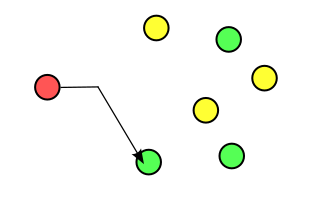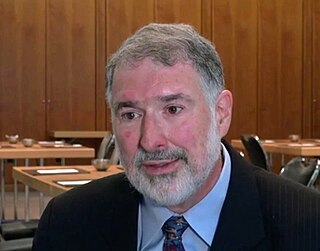Related Research Articles

The history of the Internet has its origin in information theory and the efforts of scientists and engineers to build and interconnect computer networks. The Internet Protocol Suite, the set of rules used to communicate between networks and devices on the Internet, arose from research and development in the United States and involved international collaboration, particularly with researchers in the United Kingdom and France.
The Internet protocol suite, commonly known as TCP/IP, is a framework for organizing the set of communication protocols used in the Internet and similar computer networks according to functional criteria. The foundational protocols in the suite are the Transmission Control Protocol (TCP), the User Datagram Protocol (UDP), and the Internet Protocol (IP). Early versions of this networking model were known as the Department of Defense (DoD) model because the research and development were funded by the United States Department of Defense through DARPA.

Network address translation (NAT) is a method of mapping an IP address space into another by modifying network address information in the IP header of packets while they are in transit across a traffic routing device. The technique was originally used to bypass the need to assign a new address to every host when a network was moved, or when the upstream Internet service provider was replaced, but could not route the network's address space. It has become a popular and essential tool in conserving global address space in the face of IPv4 address exhaustion. One Internet-routable IP address of a NAT gateway can be used for an entire private network.

Robert Elliot Kahn is an American electrical engineer who, along with Vint Cerf, first proposed the Transmission Control Protocol (TCP) and the Internet Protocol (IP), the fundamental communication protocols at the heart of the Internet.

Anycast is a network addressing and routing methodology in which a single IP address is shared by devices in multiple locations. Routers direct packets addressed to this destination to the location nearest the sender, using their normal decision-making algorithms, typically the lowest number of BGP network hops. Anycast routing is widely used by content delivery networks such as web and name servers, to bring their content closer to end users.

FTP Software, Inc., was an American software company incorporated in 1986 by James van Bokkelen, John Romkey, Nancy Connor, Roxanne van Bokkelen, Dave Bridgham, and several other founding shareholders, who met at Toscanini's in Central Square after an email went out over the Bandykin mailing list looking for people interested in starting a company. Their main product was PC/TCP, a full-featured, standards-compliant TCP/IP package for DOS. The company was based in Andover, Massachusetts. It also had a number of offices throughout the United States and overseas.
Karl Lehenbauer was the founder of NeoSoft in the early 1990s, which was the first Internet Service Provider in the southern United States as well as the first to offer cable modem service in Houston, Texas, among other technological milestones. NeoSoft was later sold to Internet America in 1999. Lehenbauer also wrote the Internet (socket) capabilities of the Tcl programming language.

John S. Quarterman is an American author and longtime Internet participant. He wrote one of the classic books about networking prior to the commercialization of the Internet. He has also written about risk management.

FlightAware is an American multi-national technology company that provides real-time, historical, and predictive flight tracking data and products. As of 2019, it is the world's largest flight tracking platform, with a network of over 32,000 ADS-B ground stations in 200 countries. FlightAware also provides aviation data and predicted ETAs to airlines, airport operators, and software developers. FlightAware is a subsidiary of Collins Aerospace, with headquarters in Eleven Greenway Plaza in Houston and sales offices in New York City, Austin, Singapore, and London.
Adam Dunkels is a Swedish computer scientist, computer programmer, entrepreneur, and founder of Thingsquare, an Internet of things (IoT) product development business.

Inmarsat is a British satellite telecommunications company, offering global mobile services. It provides telephone and data services to users worldwide, via portable or mobile terminals which communicate with ground stations through fifteen geostationary telecommunications satellites.
EUnet was a very loose collaboration of individual European UNIX sites in the 1980s that evolved into the fully commercial entity EUnet International Ltd in 1996. It was sold to Qwest in 1998. EUnet played a decisive role in the adoption of TCP/IP in Europe beginning in 1988.

Douglas Earl Comer is a professor of computer science at Purdue University, where he teaches courses on operating systems and computer networks. He has written numerous research papers and textbooks, and currently heads several networking research projects. He has been involved in TCP/IP and internetworking since the late 1970s, and is an internationally recognized authority. He designed and implemented X25NET and Cypress networks, and the Xinu operating system. He is director of the Internetworking Research Group at Purdue, editor of Software - Practice and Experience, and a former member of the Internet Architecture Board. Comer completed the original version of Xinu in 1979. Since then, Xinu has been expanded and ported to a wide variety of platforms, including: IBM PC, Macintosh, Digital Equipment Corporation VAX and DECstation 3100, Sun Microsystems Sun-2, Sun-3 and SPARCstations, and Intel Pentium. It has been used as the basis for many research projects. Furthermore, Xinu has been used as an embedded system in products by companies such as Motorola, Mitsubishi, Hewlett-Packard, and Lexmark.

Glenn Ricart is a computer scientist. He was influential in the development of the Internet (ARPANET) going back to 1969 and early implementation of the TCP/IP protocol. Since then he has been active in technology and business as well as donating his time to philanthropic and educational movements.

Karl George Auerbach is a California attorney and internet protocol engineer who made many significant contributions to the development of the Internet, Internet governance and the commercialization of many internet technologies. Mr. Auerbach is also known for suing the Internet Corporation for Assigned Names and Numbers (ICANN)—of which he was an elected board member—for refusing to share corporate records in 2002. ICANN controls the assignment of domain names and IP addresses.

Danny Cohen was an Israeli American computer scientist specializing in computer networking. He was involved in the ARPAnet project and helped develop various fundamental applications for the Internet. He was one of the key figures behind the separation of TCP and IP ; this allowed the later creation of UDP.

Triumph Group, Inc. is a supplier of aerospace services, structures, systems and support. Based in Berwyn, Pennsylvania, United States, Triumph engineers, designs, and manufactures aircraft components, systems and accessories. Several services and products are offered through three of their operating organizations, Integrated Systems, Aerospace Structures, and Product Support.

Airborne Internet is a concept that overlays network theory and principles into the transportation realm. The system goal is to establish information connectivity. To reach that goal, the system must create a scalable, general purpose, multi-application data channel for people in transit.
A long-running debate in computer science known as the Protocol Wars occurred from the 1970s to the 1990s when engineers, organizations and nations became polarized over the issue of which communication protocol would result in the best and most robust computer networks. This culminated in the Internet–OSI Standards War in the 1980s and early 1990s, which was ultimately "won" by the Internet protocol suite (TCP/IP) by the mid-1990s and has since resulted in most other protocols disappearing.
References
- ↑ "FlightAware to become part of Collins Aerospace". www.aopa.org. February 9, 2021. Retrieved November 1, 2023.
- ↑ "Bootstrapped, Profitable, & Proud: FlightAware". 37signals. February 25, 2011.
- ↑ TCP/IP Unleashed (paperback) (2nd ed.). Sams. December 10, 1999. p. 1000. ISBN 0-672-31690-0.
- ↑ "Travel talk: Online and dangerous". CNN. October 13, 2003.
- ↑ "ITYT Acquired by Social Knowledge". ITYT. May 12, 2006. Archived from the original on September 4, 2006.
- ↑ "Most Admired For-Profit CEO: Daniel Baker". www.bizjournals.com. August 23, 2018. Retrieved December 8, 2019.
- ↑ "Daniel Baker". FlightAware. 2021. Retrieved March 3, 2021.